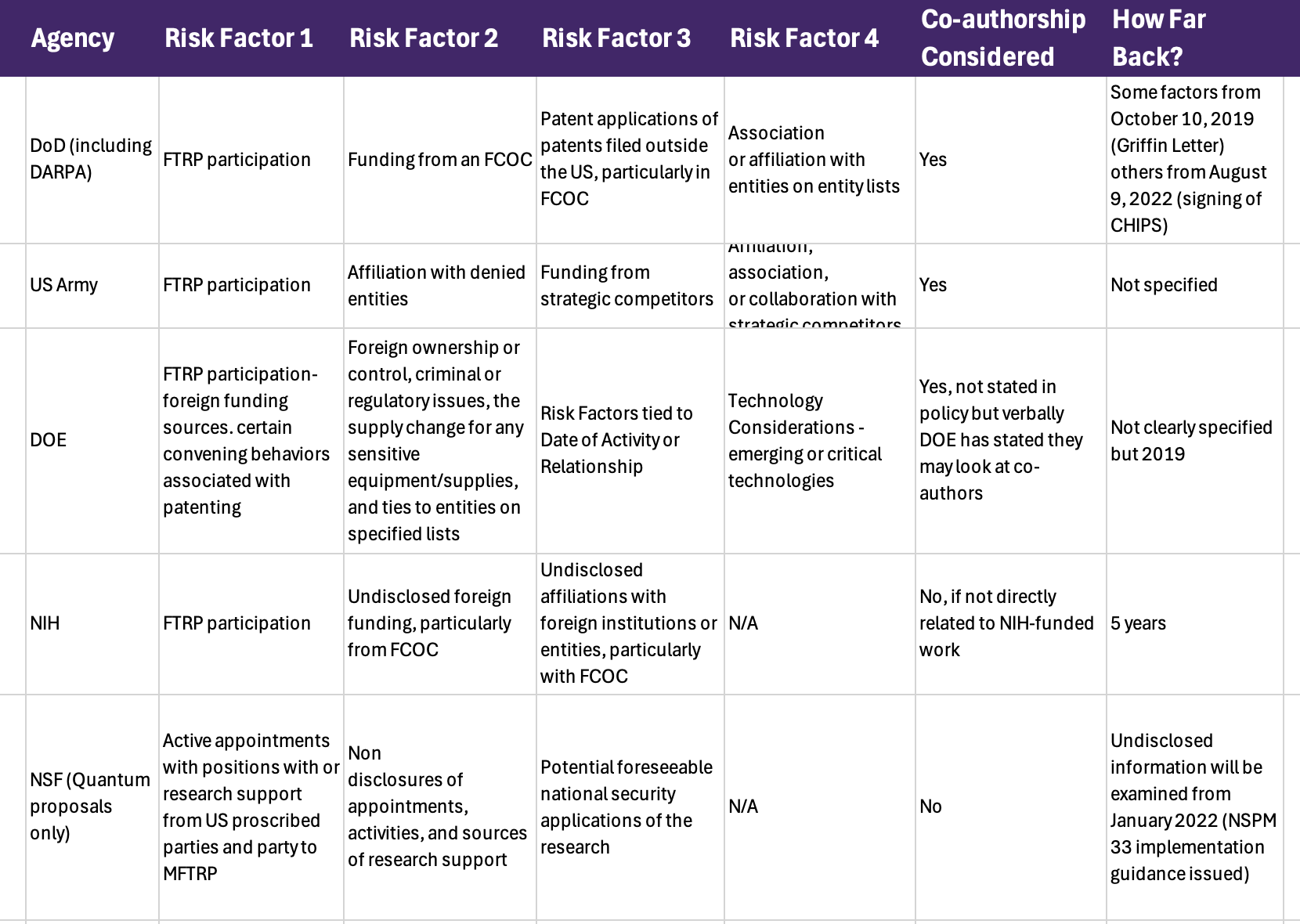Federal Agency Risk Assessment
Several federal funding agencies (DOD, DOE, NIH, NSF) have published information on how they assess certain international risk factors, and which factors may warrant mitigation or impact funding opportunities. These matrices provide insight into what specific international activities bear risk to the agencies and to what degree. The risk criteria differs by each agency, so it is important to review guidance from the agencies you work with or hope to work with carefully. However, common areas of concern include but are not limited to foreign talent plan participation; foreign funding (disclosed and undisclosed), positions, affiliations, and associations with foreign countries of concern (FCOC - China including Hong Kong and Macau, Iran, North Korea, and Russia); collaborations with restricted parties or denied entities; foreign patents; and co-authorships with FCOC for some agencies, etc.
Federal Agency Risk Matrices
The chart below provides a general overview of the risk factors considered by each listed agency. The risk factors may be weighted differently by agency based on a range of factors including when the activity occurred. Most agencies are looking back five years but may treat the risk factor differently whether it occurred before or after the passage of the CHIPS & Science Act, August 9, 2022.
Key:
FCOC = Foreign Country of Concern
FTRP = Foreign Talent Recruitment Program
MFTRP = "Malign" Foreign Talent Recruitment Program

Adapted with permission from Vanderbilt University
Links to Individual Agencies
For more specific information about each agency’s risk assessment and risk matrices, please consult the following links:
FAQs
What happens if the activity you engage in is deemed high risk?
If an activity is assessed as high risk, it may impact your federal funding, and the award may not be granted. In most instances, the federal government will give you the opportunity to develop a mitigation plan. The Export Controls & International Compliance (ECIC) team will assist you in preparing a mitigation plan. The ECIC has prepared a number of plans in coordination with faculty. The majority of the plans were accepted by the federal government and the awards were granted. In three instances, the federal government did not accept the mitigation plans and the funding was denied.
What can you do to avoid issues?
One of the most important things you can do to avoid foreign influence concerns from the federal government is to properly disclose required information to federal agencies and to Northwestern. Timely and accurate disclosure is an important part of complying with federal requirements and University policies and helps identify potential risks. See this resource for disclosure guidance. You should also request Restricted Party Screenings from the Export Controls & International Compliance team on your collaborators to make sure they are not on U.S government restricted lists and ask questions.
Can we work with foreign countries of concern (FCOC, China including Hong Kong and Macau, Iran, North Korea, and Russia)?
It depends. International collaborations are critical to scientific breakthroughs and Northwestern highly values global partnerships. There are many research activities that we can and should continue to do with countries that have been designated as FCOC by the U.S. federal government. However, due to the regulations, we recommend you coordinate with the ECIC team for guidance.
- For example, we can participate in some activities with certain FCOC, but you will want to make sure the potential collaborator is not on a restricted list or that their home institution is not a denied entity or restricted party. We also have to navigate OFAC regulations, as many activities with comprehensively sanctioned countries require an OFAC license or a documented exemption, and some activities are completely prohibited. Working with the ECIC team will help you avoid export control, OFAC, and foreign influence issues with the federal government. Contact the for a review.
- If you are applying for or receiving federal funding you cannot be a member of a “malign” foreign talent recruitment program. In addition, some federal awards include language that foreign talent program members (even non-malign) cannot work on certain projects. If you are receiving something of value (monetary or non-monetary, even an honorific title) from a FCOC, it may very likely meet the definition of a foreign talent recruitment program. Please reach out to the ECIC before accepting something of value, traveling to a FCOC, or before starting a research collaboration with individuals located in a FCOC. See Northwestern’s Research Security website and Export Control website for more information.
- Whether giving a virtual presentation in a FCOC is allowable depends on the country. For example, we can participate in many conferences and some research activities hosted in China, including Hong Kong, but you will want to make sure the conference organizers or potential sponsor(s)/collaborator(s) are not on a restricted list or that their home institution is not a restricted party. This will help avoid export control, OFAC, and foreign influence issues with the federal government.
- However, you need an OFAC license to engage in most activities with individuals or entities in, or ordinarily resident in, Iran and North Korea (as is the case for comprehensively OFAC-sanctioned countries). These activities include research collaborations, attending a conference, and presenting (even virtually) to an audience in these countries. OFAC also administers certain selective sanctions on Russia. Russia-related sanctions cover transactions involving blocked property and prohibitions in certain sectors, including energy, IT /software services, quantum computing, aerospace, and electronics. Contact the ECIC for a review.
Who can you contact with questions?
